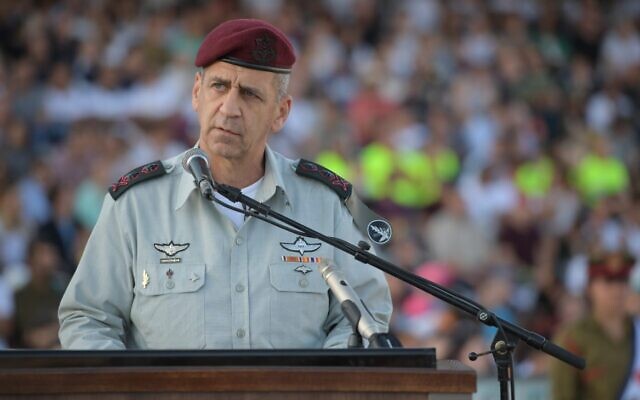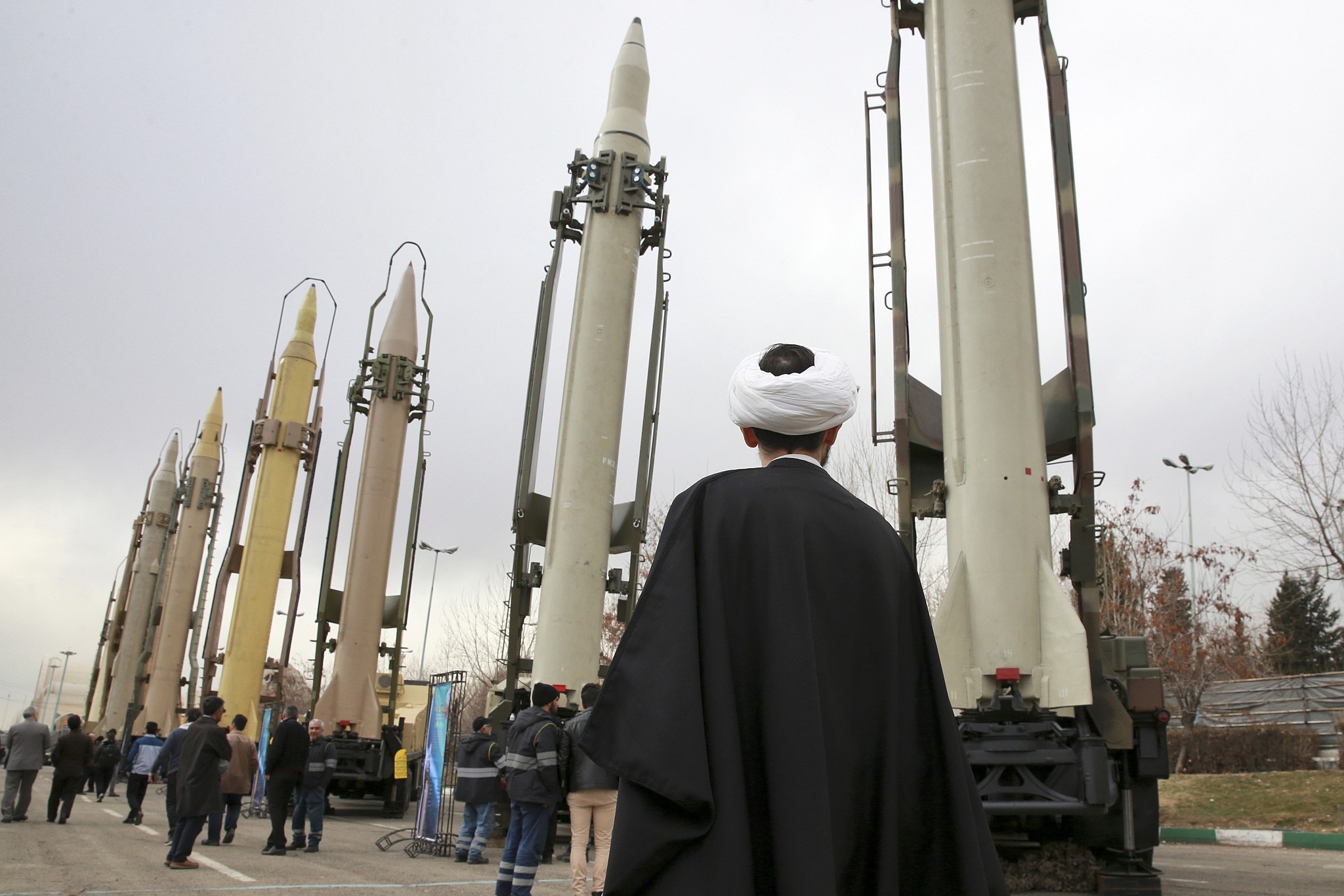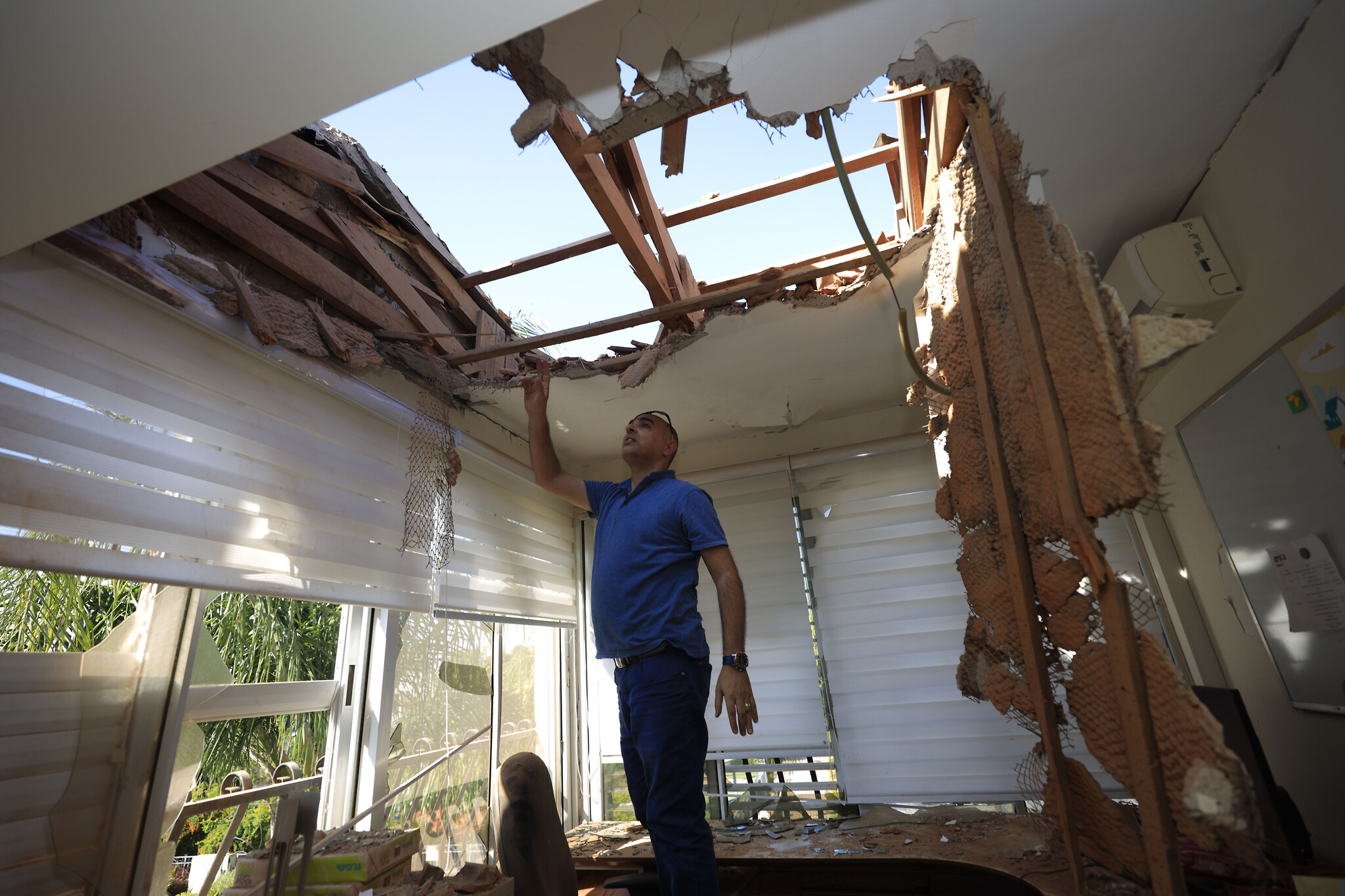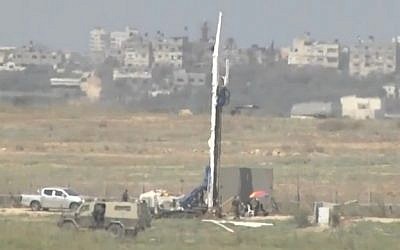Kohavi says there is a chance for a long-term ceasefire in Gaza, but threatens that the military won’t hesitate to use its full force in the Strip’s urban centers if necessary
By Judah Ari Gross, TOI

IDF chief Aviv Kohavi speaks at a graduation ceremony for new IDF officers on October 31, 2019. (Israel Defense Forces)
IDF Chief of Staff Aviv Kohavi on Wednesday lamented that Israel is alone in the fight against Iran and its proxies in the Middle East, as the Islamic Republic grows increasingly aggressive in the region.
“It would be better if we weren’t the only ones responding to them” using military force, Kohavi said, in an apparent criticism of the United States and Persian Gulf countries, who also see Iran as a major foe.
The army chief delivered a wide-ranging speech on Israel’s national security and the state of the Israel Defense Forces at a conference in honor of former IDF chief of staff Amnon Lipkin-Shahak at the Interdisciplinary Center in Herzliya. It was Kohavi’s first major speech on Israel’s national security since taking his position last January, speaking for a full hour.
“In recent years, Iran has changed its policies and is much more active,” Kohavi said, noting attacks in recent months on petroleum facilities in Gulf states.
“And there’s no response, there’s no retaliation, there are no reprisals,” he said.

Kohavi also addressed the situation in the Gaza Strip, where Israel has been working, with assistance from Egypt, to negotiate a long-term ceasefire with the enclave’s de facto rulers, the Hamas terror group.
“We will allow civil relief in exchange for significant security improvements in Gaza. That’s not my policy, that’s the government’s,” Kohavi said.
According to Kohavi, last month’s two-day battle between the IDF and the Palestinian Islamic Jihad, the second most powerful terror group in Gaza, made such a ceasefire more possible. Unlike in previous bouts in the Strip, Israel did not target Hamas facilities, instead focusing its attacks almost solely on the PIJ.

“We wanted to put the PIJ back in its place, something Hamas wouldn’t do, so we did it,” he said.
“As I speak, there’s an opportunity. Hamas is back dictating the order of the day — even if there’s a rocket or mortar here or there, which we won’t accept,” he said, referring to recent attacks from Gaza, which military officials have indicated were the work of smaller, more radical terror groups, not Hamas.
The army chief added that Israel was prepared to go to war if needed in order to restore quiet to the Gaza region.
“War is always the last choice, but in cases where all other paths have been exhausted, war is a solution, a military operation is a solution,” he said.
Iran is everywhere
Kohavi said Iran was working to set up forward operating bases throughout the region, from which it could itself carry out attacks against Israel, with its Islamic Revolutionary Guard Corps’ expeditionary Quds Force, or order its proxies in the region, notably the Hezbollah terror group, to do so.
“We won’t allow Iran to establish a military presence in [Syria], or even in Iraq,” he said.
The military chief said the IDF was operating throughout the region — openly, covertly and clandestinely — in order to thwart the plans of Iran and its proxies, “even at the risk of war.”

Kohavi specifically referred to efforts by Iran and Hezbollah to develop precision guided missiles — a threat that Israeli officials generally consider to be second only to a nuclear-armed Iran — as the type of issue that the IDF would risk war in order to prevent.
“We won’t allow our enemies to acquire precision weapons,” he said.
According to Kohavi, one of the defining characteristics of Israel’s current national security situation is that both the number of arenas from which the Jewish state faces threats and the number of threats within each arena are growing.
“In Syria, there are Hezbollah forces and Quds forces [in addition to the Syrian military]. In Gaza, there are also proxies of the Iranians [in addition to Hamas and the PIJ],” he said.
The army chief noted that Iraq, where Iran controls a large number of Shiite militias, has also become an area of increasing concern for Israel.

Kohavi added that Iran itself had also become a direct and immediate military threat to Israel, whereas, in the past, it was “back behind the mountains, working on a nuke program.”
“Iran is continuing to develop missiles that can reach Israeli territory. This is somewhat flying under the radar,” he said.
He also addressed Iran’s recent violations of the 2015 nuclear deal by Iran, doubling its amount and level of enriched uranium beyond the approved levels of the agreement. Kohavi said these actions are currently part of an effort to exert pressure on the US and Europeans as part of negotiations, not an actual effort to develop a nuclear weapon, but that this would eventually change.
“Iran is doing this as part of a strategic dialogue with the US. But at some point, it will leave the realm of a strategic dialogue and enter into a real threat,” he said.
Preparing for war
In his address, Kohavi said he did not see war in the offing, due to effective Israeli deterrence, but made clear that the next war that the Jewish state faced — whether against Hezbollah in the north or Hamas in the south — would be more difficult and disastrous than the ones before it, owing to technical improvements of the terror groups’ capabilities.
“In terms of rockets, the number and the range and the size of the warheads and the accuracy have all grown.”
Kohavi said the IDF was, of course, aware of these threats, was prepared for them and was working to further improve its defenses, but warned that despite this, the threats of Israel’s home front remained. “We have to prepare for this,” the general said.

“You can’t have a war without casualties. I can’t promise you a short war. I’ll do what I can to shorten it, but during that time, the home front will be hit,” he said.
“We will need resilience on the home front.”
He noted that since the 2006 Second Lebanon War, Hezbollah had worked to improve its capabilities as well, putting it on par with some national armies.
“Hezbollah isn’t just running around with Kalashnikov assault rifles and anti-tank missiles. It has anti-aircraft weapons and spectrum suppression equipment,” he said, referring to electronic warfare capabilities.
Kohavi said he did not believe that Iran or its proxies would imminently launch a war against Israel.
“None of our enemies want a war at this time,” he said.
Feelings of security
In recent years, some of the most regular and vehement criticism against the IDF and Israel’s security strategies have been in regards to the military’s responses to violence from the Gaza Strip.
Kohavi rejected some of this criticism, saying the IDF had effectively blocked the majority of attacks from the Strip and that the issue was not with security but with the “feeling of security” among residents of the Gaza periphery. However, he said that a feeling of security was not unimportant, just less important than actual security.

“Every time there’s a rocket siren interrupting the night or the party, or the shabbat dinner, people say there’s no security,” he said.
“I differentiate between security and feeling of security. Security comes before a feeling of security. But we need to give people a feeling of security,” Kohavi said.
Kohavi said he hoped a long-term ceasefire agreement with Hamas would be signed soon, but said Israel would not hold back from a military operation if necessary.
The army chief said he knew this would mean fighting in highly complicated urban areas, where Hamas has established many military facilities, believing that Israel would be more cautious and hesitant in such a densely populated location, full of civilians.
“The enemy decided to base itself in an urban environment, but we will respond forcefully,” he said. “We will warn the civilians who live there and give them time to evacuate.”
Kohavi said that the IDF would not refrain from attacking the civil infrastructure used to by terror groups to attack Israel.
“We will strike the infrastructure of the country that allows this, the gas, fuel, and roads. Countries that allow or encourage terror groups to operate in their borders must know that they will be held responsible,” he said, specifically listing Gaza, Lebanon and Syria.

The army chief referred to a case in last month’s battle in Gaza, in which he said “a lot of civilians were killed” when the IDF bombed a Palestinian family’s home that had apparently been incorrectly identified as a PIJ military facility, and acknowledged that errors had been made in the process of choosing the target.
“We investigated this for dozens of hours, dozens of hours. The lessons were learned,” he said.
Preparing for the future
Kohavi also discussed the military’s preparations for the future under his proposed multi-year plan known as “Momentum” in English, or “Tenufa” in Hebrew.
According to the army chief, his efforts to roll out this plan are being stymied by Israel’s current political impasse, which is preventing the passage of the necessary budget.

Kohavi said that the new security fence and underground protective barrier being constructed around the Gaza Strip in order to thwart both subterranean tunnels and above ground infiltration attacks was nearing completion.
“By the summer of 2020, the barrier will be completed,” he said.
Kohavi added that improvements were also being made along the northern border and within the West Bank in order to prevent terror attacks there.
The army chief said one of the most important lessons learned by the IDF in recent years was an understanding that the military had to win wars “quickly and decisively.”
“We need to cause our enemies to grow weary,” he said.
Kohavi offered an example of old-style military thinking that would not work today, Israel’s conquering of the Golan Height in the 1967 Six Day War.
The Syrian military until then had long been using the Golan Heights to attack nearby Israeli settlements, which prompted the IDF to capture the area. But this did not prevent Syria from attacking Israel just a few years later, in the devastating 1973 Yom Kippur War.
“It’s not enough to conquer the Golan and reach a certain line. We must destroy the assets of the enemy,” he said.
“If you reached a line, but you didn’t destroy the enemies rockets along the way, you didn’t succeed,” Kohavi said.



Leave a Reply
You must be logged in to post a comment.